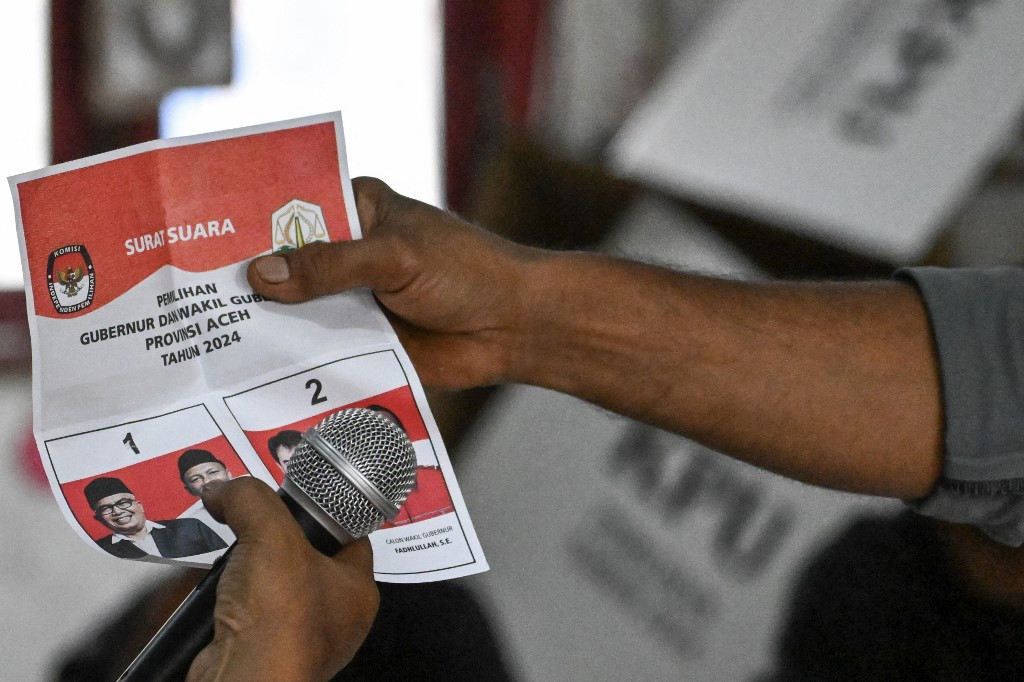Popular Reads
Top Results
Can't find what you're looking for?
View all search resultsPopular Reads
Top Results
Can't find what you're looking for?
View all search resultsDirect elections safe, for now
Massive political education is crucial to educate the public of the risks of restoring indirect elections.
Change text size
Gift Premium Articles
to Anyone
S
ince the inaugural direct regional head elections in 2005, nobody has managed to rob your right to choose your governors, mayors and regents.
On Aug. 14 the Constitutional Court made it clear that political right should stand, amid yet another move to reinstate the New Order mechanism that let a select few choose regional heads on behalf of the people.
In its judicial opinion issued as part of a ruling on the minimum votes for candidates to win regional elections, the court said governors, mayors and regents are elected directly by people every five years, as in the presidential and legislative election.
The court cited some of its past rulings saying the direct election system mandated by the Constitution applied to all elections, with exception of Yogyakarta.
The opinions of the court, billed as the guardian of the Constitution, must be taken into account by the executive and legislative branches of power, or else the system of checks and balances will be undermined.
Outside of the courtroom, politicians from the country’s biggest political parties, such as the Gerindra Party, Golkar Party and the National Awakening Party (PKB), have been entertaining the idea of returning the power to elect governors, mayors and regents to regional legislatures (DPRD), as happened during the authoritarian rule of Soeharto. In practice, candidates who won the most votes from DPRD members would not necessarily assume office, unless they received Soeharto’s consent.
The pro-government political parties are advocating indirect regional elections because the current system places a heavy financial burden on both the state and candidates, not to mention its vulnerability to vote-buying practices.
President Prabowo Subianto himself suggested in December of last year, less than two months into his presidency, that he would support the idea of abolishing direct elections for regional heads.
Prabowo’s Gerindra Party and Golkar have been fervent supporters of the Soeharto-era indirect election system since 2014, when they voted in favor of returning to the old system during a House session which saw the majority opt to discontinue direct regional elections. The PKB on the other hand voted for direct elections at the time.
The House’s decision was met with widespread public outcry and the resulting law was overturned by a regulation in lieu of law (Perppu) issued by then-president Susilo Bambang Yudhoyono shortly after.
Despite the Constitutional Court’s opinion, the proponents of indirect elections give no assurance that they will give up their efforts. Home Minister Tito Karnavian, clearly under big pressure, has promised to evaluate the current electoral system.
Only the Indonesian Democratic Party of Struggle (PDI-P), the only de facto opposition in the country, has welcomed the court’s opinion and been steadfast in defending direct regional elections. But the PDI-P alone cannot save direct regional elections from the Prabowo’s coalition, which controls 82 percent of the House seats.
Public pressure can do so, as evident in previous mass demonstrations opposing government policies. Massive political education is urgently required to educate the public of the risks of restoring indirect elections.
The old system proved to strengthen oligarchy in representative bodies and political parties, as well as distance people from meaningful participation in the democratic process.
The argument that direct regional elections are costly for candidates is unconvincing when it is actually the political parties that tend to cause high costs in elections because of transactional politics.
Direct elections, on the other hand, enable people to select their leaders and hold them accountable for their performance in office. This unfolded recently in Pati regency in Central Java, where thousands of people took to streets to demand the regent’s resignation for an arbitrarily increased property tax.
Democracy is sometimes messy, even costly. But it is worth it.
After all, the current system gives a fair chance to political parties to nominate their candidates. People deserve an equal chance, by voting for candidates who they think are the best.
Once the elite rob people’s right to elect their regional leaders, they will try to deprive the people of their right to elect the president.











